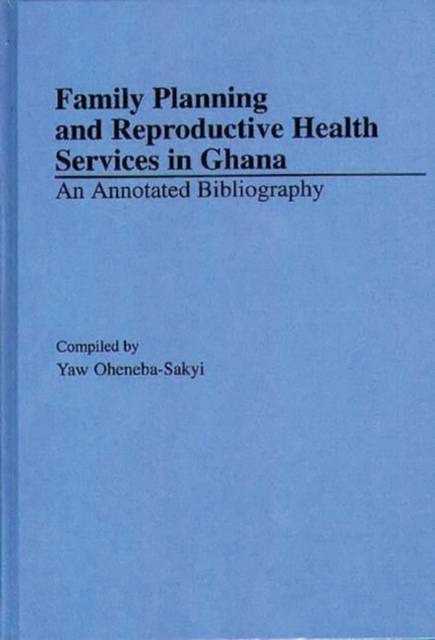
- Retrait gratuit dans votre magasin Club
- 7.000.000 titres dans notre catalogue
- Payer en toute sécurité
- Toujours un magasin près de chez vous
- Retrait gratuit dans votre magasin Club
- 7.000.000 titres dans notre catalogue
- Payer en toute sécurité
- Toujours un magasin près de chez vous
Family Planning and Reproductive Health Services in Ghana
An Annotated Bibliography
Yaw Oheneba-SakyiDescription
The second most populous country in the West African subregion, Ghana is plagued by a population growth rate that far exceeds its economic growth rate. Hence, comprehensive action in family planning is needed to improve the country's social and economic well-being. Although studies on family planning and reproductive health are not lacking, the information is scattered. This annotated bibliography compiles the existing works on family planning and reproductive health in Ghana into a single resource guide. Every effort has been made to include all scholarly works, books, chapters in books, conference papers, discussion papers, periodical literature, public documents, thesis and dissertations, and technical reports, thereby providing scholars and practitioners with quick access to a wide range of research materials.
The book is arranged into six topical chapters. Chapter one covers population dynamics, with a focus on general population characteristics and trends in population growth through fertility, mortality, and migration. Chapter two lists works on general reproductive behavior and contraception, including attitudes toward fertility, fertility preference, men's role in contraception and contraceptive devices. Chapter three includes works dealing with family planning program development and evaluation. Chapter four turns to factors other than contraception affecting fertility, such as breast-feeding, sexual practice, maternal age, birth intervals, nuptiality, sex roles, and sex preference. Chapter five is devoted to studies concerning primary health services, such as health delivery systems, child and maternal health, nutrition, traditional birth attendants, disease, and abortion. The final chapter covers general population policy and legislation.Spécifications
Parties prenantes
- Auteur(s) :
- Editeur:
Contenu
- Nombre de pages :
- 176
- Langue:
- Anglais
- Collection :
- Tome:
- n° 18
Caractéristiques
- EAN:
- 9780313289002
- Date de parution :
- 18-07-94
- Format:
- Livre relié
- Format numérique:
- Genaaid
- Dimensions :
- 156 mm x 234 mm
- Poids :
- 417 g







